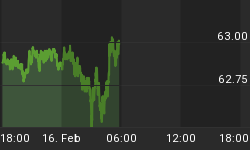The segment below was written and distributed only to the media within an hour of last week's Federal Reserve interest rate hike, with excerpts/themes picked up by various national media. At the prompting of a colleague, I have decided to post it here along with updated comments:
Tuesday, August 9th, 12:00pm, PDT-
The market, uncharacteristically, is typically correct in its expectations of Federal Reserve interest rate actions; indeed, it is with this fact in mind that many argue that the Fed merely follows the market with regard to setting interest rate policy. Were there ever a time for the Fed to surprise the market, however, that opportunity existed today - the Fed should have taken advantage of a number of current economic conditions to hike by 50 basis points at Tuesday's meeting.
I'm well aware that mainstream economists had been hoping for the opposite - a signal that the end to the Fed's tightening campaign was near, but I disagree with that sentiment based on the following factors:
-
With the recent rise in long-term rates (the Ten-year Treasury stands at 4.4%), the yield curve had garnered enough of a spread to allow for a .5% hike in the Fed Funds rate to 3.75%, a level it is all but certain to reach in six weeks, anyway.
-
Only two months ago, market watchers spoke with near certainty about a looming inversion of the yield curve, perhaps at the 3.5% level, yet long-term interest rates have recently backed up on renewed inflation fears. The recent spikes in oil, gold and even in the improvement in wage rates would have given the Fed plenty of cover to say after today's meeting, "we needed to act aggressively to contain inflationary pressures." And although a 50 basis point hike would have been negatively received, initially, it soon after may actually have been viewed as a huge vote of confidence in what the Fed believes to be the underlying strength of the U.S. economy, a surprise to a world that still suspects our debt-dependent economy is too fragile to risk any sudden jolts. Unfortunately, today's action may do little to impact the recent movement in the price of oil, in particular, thus any near-term economic weakness may be attributed to the painful impact higher oil prices are having rather than the "normal" impact one would expect from a more aggressive Fed tightening campaign.
-
Why an economic slowdown? The U.S. stock and bond markets are now overbought and oversold, respectively. If reversals that would bring a simultaneous stock market decline and bond market rally seem imminent, anyway, together these would be taken as signs of a market that is worried again about looming economic weakness, thus calling the sustainability of the Fed's tightening bias into question and potentially leading it to halt its hikes sooner than the 4%-range or above, which the market had recently come to expect. If the market readjusts its Fed Funds expectations back down, that would be a huge negative for the U.S. Dollar, whose rally has been largely supported by the Fed's actions this year and which has started to act poorly of late... the Greenback could have used a boost today.
-
Real Estate: if a housing bubble exists, which it surely must in at least some markets, then it can be rightly said that the primary cause has been the sloppy lending that has been taking place in the mortgage lending arena. As of yet, aggressive lending practices haven't receded noticeably, which means it may actually make sense for the Fed to specifically attempt to flatten the yield curve; with rates still near generational lows, removing the profitability/attractiveness of risky lending by erasing the spread between short and long-term rates will have a much bigger impact than hoping a move from 4% to 4.5% in the benchmark ten-year Treasury will do the trick.
Acting to more aggressively rais e the Fed Funds rate is not without risk since an inverted yield curve (and recession) could still result. However, if I'm reading things correctly and the market is poised in such a way that we'll soon be worrying again about another "soft patch" or worse, anyway, then the Fed missed an opportunity.
Short-term rates are inching higher from what were such extremely low levels that the Dollar is still in need of support and the Fed Funds rate will need to first get even higher if the Federal Reserve wants to consider rate cuts as a "cure" for the next recession, whenever it should arrive. Therefore, when economic conditions as well as the long end of the yield curve give the Fed room to be more aggressive in raising rates, it needs to take advantage.
- end of excerpt -
The above release is now part of a full-length article, one that also contains comments on gold and the Euro and is available at our website, www.deltaga.com.
















